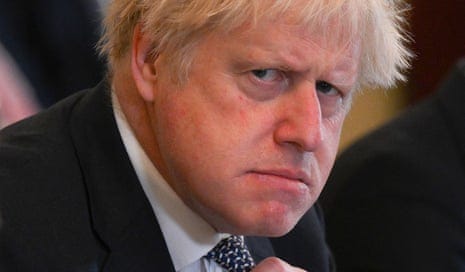Idleness and idolatry: The conceit and deceit of Boris Johnson
Pontius Pilate shared his contempt for truth, writes George Pitcher
Picture this imaginary scene. The Chair of the Commons Privileges Committee summons former prime minister Boris Johnson to her office earlier this year, ahead of his appearance before it, to answer charges that he misled parliament.
“When you testify, we want you to speak the truth,” she says. “What is truth?” replies Johnson.
To be clear, I’m not making a sub-messianic claim for Harriet Harman, chair of the committee that has recommended a (now notional) 90-day suspension for Johnson from parliament for deliberately misleading it.
Nor is Johnson to be cast as Pontius Pilate, who had at least some grasp of his duty, though the similarities there are closer and I’ll develop them in a moment. What I’m saying is that a struggle to know what is truth is central to the rise and fall of both Johnson and Pilate.
Deceit as a way of life
For Johnson, deceit is not so much a character trait as a way of life. Deceit is to be distinguished from lying in that, while its apparatus is lies, deceit is the dishonest and/or illegal methodology used to make people believe that something is true when it is not.
This is vividly apparent in the claims made for Johnson by his dwindling band of supporters in the face of the Privileges Committee’s savage condemnation, defending his last redoubt like Japanese soldiers who haven’t been told the war is over. They trot out a triune litany of his saving graces – that he got Brexit done; that he rolled out the UK’s covid vaccines quicker than anyone and that he mobilised the free world in support of Ukraine.
Pound-shop Churchill
Except that he didn’t. He didn’t get Brexit done, he simply ignored Northern Ireland and signed a treaty that he never intended to honour. Covid vaccines were down to British private-sector pharmaceutical enterprise and anyway we were still in the EU single market. Johnson seized the opportunity for his pound-shop Churchill impression when Ukraine was invaded, but overwhelmingly its greatest support has come from the US.
This is deceit, as distinct from lies, constructing a dishonest narrative that is simply untrue. Perhaps that’s the way of our politics, but one must hope it isn’t. Because, if it is, something much more structurally vulnerable is being built.
Intolerably smug
There is reason for hope. Forgive me if what follows sounds intolerably smug, but we columnists so seldom predict the future accurately that, on the rare occasion that we do, we tend to milk it. In July 2019, when Johnson was poised to be elected leader of his party and therefore, by default, the country’s prime minister, I wrote in The Guardian:
“There is nowhere to hide as PM. Johnson will not be able to rely on his staff to cover for him, as he has in journalism and as mayor… Fairly soon, the whole civil service will be working for him and, unlike the vainglorious groupies who currently prop him up, they will not carry the can for him for long.”
So it has proved, even if it pleases the Johnson camp to call his enemies the “blob”, the “establishment” or a “kangaroo court”. As that Guardian piece noted, there is nowhere to hide in Number 10, even in the family flat with Abba turned up to full blast.
Divine justice
And there is a sort of divine justice in finding nowhere to hide from the truth. Apologies again for the self-regard but, at about the same time in 2019, I wrote another Guardian piece that said it was a Christian imperative to call out the moral turpitude of Johnson. I said the Church had shown a shameful reticence for doing so.
As recently as Monday of this week, Archbishop of Canterbury Justine Welby was still trotting out the line, at the Religious Media Centre’s London conference, that whether Johnson was “morally fit to lead Britain” was “for the parliamentary process to conclude, not me.”
Pressed, he conceded that there was “very certainly a moral take on leadership” and said “leaving the constitution and the country in a better place than you found it [is the] key objective of politics”.
Narcissistic syndrome
It may surprise no one that I’ll go further than that. The kind of narcissistic syndrome from which Johnson is widely diagnosed to suffer has at its core the replacement of objective truth with self-interest. This is a form of self-idolatry, the making of an idol of oneself. A symptom of that is the almost universal observation that for Johnson the truth is whatever he wants it to be – and, in the moment, he believes it.
This is as true of Old Testament rulers such as Jeroboam as it is of the gospel’s Pontius Pilate, who has history’s worst day at the office as he fails to recognise the truth even when, literally, it stares him in the face.
Pilate’s eternal, rhetorical question – “What is truth?” - makes truth a moveable feast. Johnson has partied at that feast wherever he has chosen to find it. What he must learn – though let’s not hold our breath – is that truth is only ever in one place and stares him in the face.
George Pitcher is a visiting fellow at the LSE and an Anglican priest
A version of this column appeared on PremierChristianity




